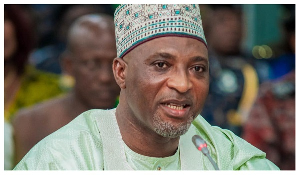In contributing to the nation’s development by seeing to the continuous expansion of the nation’s infrastructure and increase in job-creation, Standard Chartered Bank Ghana Limited has committed to always complying with Ghana’s tax laws.
According to the bank, it is time to push for more and continuous economic growth, which will improve the standard of living for Ghanaians and bring some equity in the distribution of income.
The comment comes on the heels of the bank being adjudged the country’s second-largest tax payer in 2017 at the large tax payer division of the Ghana Revenue Authority (GRA).
GRA in the award, which comes with a plaque and citation to the bank, noted that the recognition of Stanchart is appropriate because the bank consistently meets its tax obligations as it willingly files returns and makes payments on time throughout the whole year without ever being prompted by the regulator (GRA).
At GRA’s annual awards ceremony to honour employees and other stakeholders for their performance in 2017, a citation the GRA awarded to the bank stated: “Your total contribution to total domestic tax Revenue in Ghana was very impressive across all tax types in the face of the prevailing economic hardship. In fact, your compliance level in the 2016 year of assessment was overwhelming. You were always on time in terms of payment of taxes and filing of returns. The GRA is awarding Standard Chartered Bank as the 2nd-Best Taxpayer, Large Taxpayer Office 2017”.
In an interview with B&FT, the Chief Financial Officer & Executive Director-Standard Chartered Bank Ghana Ltd., Kweku Nimfah-Essuman who was elated, said it is rewarding to see that complying with tax laws in Ghana is creating shared value for the Ghanaian economy, which is helping government in its quest to sustain growth.
“Everywhere in the world, especially in developing countries, people have realised that higher tax revenues mean the state is able to invest and deliver a comprehensive range of public services such as schools, hospitals, the police force and social security. This allows a country to move from dependence on foreign aid to a more sustainable and long-term approach to development,” Mr. Nimfah-Essuman said.
He further stated: “We will continue to support Ghana’s tax administration and legislations by complying with procedures as set by the GRA, and I believe that through the ongoing collaboration with the government of Ghana, our regulators and other stakeholders, Stanchart will ensure that the economy is healthy enough to guarantee jobs that will improve life for the people of Ghana”.
The 17 Sustainable Development Goals set as part of the 2030 Agenda require a huge amount of financial investment; and in order to fund the ambitious targets of the SDGs, developing countries are expected to contribute through raising tax revenue at home.
Ghana beyond aid, he said, can only be achieved through an effective tax system that also ropes-in the over-30% informal sector, most of which are not covered by the current tax net.
Stanchart’s contributions to national development also include job-creation and corporate social investments, plus an ecosystem of suppliers and distributors who rely on the bank for sustainability of their businesses.
Due to these dealers, canvassers, retailers, creative and advertising agencies, event and media agencies, research companies, printing companies, equipment providers, contractors and providers of value added services, Stanchart is directly and indirectly responsible for approximately over 50,000 jobs around the country.
Business News of Tuesday, 24 April 2018
Source: thebftonline.com

















